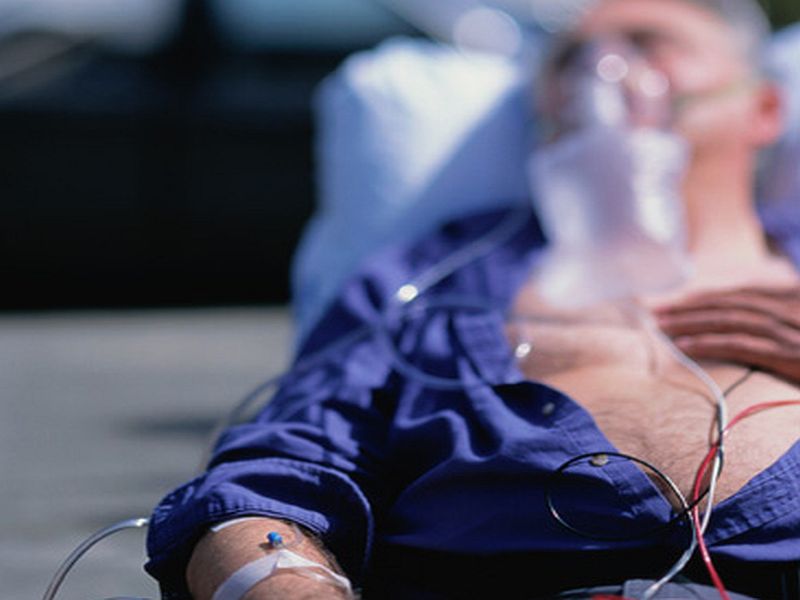“This article outlines better ways to treat SCA as opposed to the Adreneline Shot. Rather than having to treat SCA wouldn’t it make more sense to prevent it all together? So….why not get your heart screened today?”

THURSDAY, July 19, 2018 (HealthDay News) — An adrenaline shot can restart your heart if it suddenly stops beating, but a new trial shows that chances are you might not return to much of a life if you survive.
People who suffered cardiac arrest and were resuscitated with adrenaline had an almost doubled risk of severe brain damage, researchers found.
“We found adrenaline does not increase your chances of surviving without severe brain damage,” said lead researcher Dr. Gavin Perkins. He is a professor of critical care medicine at the University of Warwick Medical School in England. “In fact, of the survivors, twice as many have severe brain damage.”
The findings should prompt major medical societies to rethink guidelines for using adrenaline ( or “epinephrine”) to restart a stopped heart, Perkins said.
Heart expert Dr. Vinay Nadkarni agreed that the American Heart Association and the International Liaison Committee on Resuscitation should consider this clinical trial in future revisions of guidelines for treating cardiac arrest.
“There is concern that with the current pragmatic approach, there is risk for more survivors with severe neurologic impairment, something that the public would not want,” said Nadkarni, chair of pediatric critical care medicine at the Children’s Hospital of Philadelphia.
“But it does not mean that we should necessarily throw the baby out with the bath water,” Nadkarni continued. “There still may be an important role for [adrenaline] earlier in resuscitation or combined with other effective therapies.”
More than 350,000 cardiac arrests occur in U.S. communities every year, the American Heart Association says. Only about one in 10 victims survive.
During the trial, paramedics with five United Kingdom ambulance services randomly gave more than 8,000 cardiac arrest patients either adrenaline or a placebo after cardiopulmonary resuscitation (CPR) and defibrillation failed to restart their hearts.
The trial was inspired by evidence that’s emerged in recent years suggesting that adrenaline could harm the brain while jump-starting the heart, Perkins said.
“There’s some experimental data which show that epinephrine is helpful in raising the blood pressure and potentially restarting the heart, but it reduces the blood supply to the small blood vessels in the brain, potentially worsening brain injury,” Perkins said.
Adrenaline slightly improved a person’s chances of survival, the findings showed. About 3.2 percent of patients given adrenaline were alive a month after their cardiac arrest, compared with 2.4 percent of those who received a placebo.
Unfortunately, that survival advantage came at a cost to the brain.
About 31 percent of survivors in the adrenaline group had either moderately severe or severe brain damage, compared with 18 percent of those in the placebo group, according to the report.
That includes severe brain damage in about 21 percent of those receiving adrenaline versus 9 percent of those receiving placebo, the researchers said. In that category, survivors are bedridden, incontinent and require constant nursing care and attention.
“We found that adrenaline could restart the heart, but it was no good for the brain,” Perkins said. “The extra survivors are in a poor neurological state.”
Perkins believes that many people would not want to survive in this state, based on a survey his team conducted prior to the clinical trial.
“About 95 percent of the people we spoke to said that surviving without brain damage is more important than simply surviving,” Perkins said. “It’s a very complex question that partly depends on the value that an individual or society puts on survival versus survival with brain damage.”
Experts would do better to promote other lifesaving methods of treating cardiac arrest that have proven more effective than adrenaline, Perkins said. These mostly involve educating all potential bystanders to:
- Recognize cardiac arrest and dial 911, which is 10 times more effective than adrenaline.
- Start compression-only CPR, which is eight times more effective than adrenaline.
- Use an automatic defibrillator, which is 20 times more effective than adrenaline.
“We already have things out there that are much more effective, but they’re not universally used by members of our community,” Perkins said. “In the minutes before an ambulance arrives, it’s really our communities who can make a big difference in saving lives.”
Nadkarni agreed that focus should be placed on these bystander-centered responses to cardiac arrest.
But adrenaline still might be useful if given earlier in treatment of cardiac arrest, rather than after other resuscitation attempts have failed, Nadkarni added.
“I don’t think we should abandon it altogether,” Nadkarni said.
The findings were published online July 18 in the New England Journal of Medicine.
More information
The American Heart Association has more about cardiac arrest.
SOURCES: Gavin Perkins, M.D., professor, critical care medicine, University of Warwick Medical School, U.K; Vinay Nadkarni, M.D., chair, pediatric critical care medicine, Children’s Hospital of Philadelphia; July 18, 2018, New England Journal of Medicine, online
Last Updated:
Copyright © 2018 HealthDay. All rights reserved.

